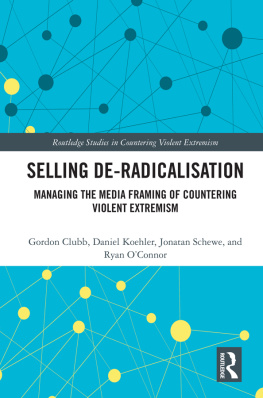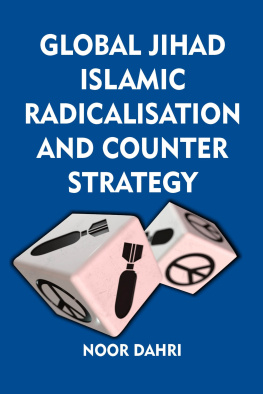Selling De-Radicalisation
This book examines how de-radicalisation programmes have been portrayed in the media and details the role of public relations (PR) strategies employed by such programmes and countering violent extremism (CVE) to create positive coverage of their work.
CVE and de-radicalisation programmes have seen a significant rise in recent years and are now cornerstones of many countries counterterrorism strategies. Despite the increased importance of these tools to counter violent radicalisation leading to terrorism, they remain controversial and sometimes receive fierce public criticism and opposition. This work looks at how CVE and de-radicalisation programmes are able to influence a countrys discourse on de-radicalisation, and how far governmental programmes differ from non-governmental initiatives in terms of their PR strategies. The book also provides a theoretical basis of how the discourse on CVE is constructed in the media. As major case studies, this book examines the United Kingdom, Germany and Nigeria. For these countries, the authors have gathered and assessed roughly 3,000 newspaper articles on de-radicalisation programmes over a decade to provide an empirical base.
This book will be of much interest to students of CVE, de-radicalisation and terrorism studies.
Gordon Clubb is Lecturer in International Security at the University of Leeds, UK. He is a Fellow at GIRDS, Germany.
Daniel Koehler is Director of GIRDS, Germany. He is a research fellow at the Polarization and Extremism Research and Innovation Lab at the American University, USA.
Jonatan Schewe is Research Associate at the Centre for Technology and Society, Berlin Technical University, Germany. He is a research fellow at GIRDS, Germany.
Ryan OConnor is a post-doctoral researcher in International Security and Foreign Policy at the University of Leeds, UK.
Routledge Studies in Countering Violent Extremism
This book series sets out to become the first interdisciplinary platform for the study of issues pertaining to countering violent extremism, such as deradicalization and disengagement programs and individuals as well as collective processes of leaving terrorism and violent extremism behind. Additional focus points will be the impact of programs, different cultural notions of CVE, results of large-scale CVE-related research projects, specific guidance for practitioners and policymakers in building and maintaining CVE programs, mechanisms to evaluate initiatives, as well as innovative techniques to design new ones. The series aims to help establish a new field of deradicalization studies and to build a bridge across the disconnect between experts from different fields, countries and specialities.
Counter-Terrorism Community Engagement
Pitfalls and Opportunities
Jason Hartley
Selling De-Radicalisation
Managing the Media Framing of Countering Violent Extremism
Gordon Clubb, Daniel Koehler, Jonatan Schewe and Ryan OConnor
Understanding Islamist Terrorism in Europe
Drugs, Jihad, and the Pursuit of Martyrdom
Lewis Herrington
For more information about this series, please visit: www.routledge.com/Routledge-Studies-in-Countering-Violent-Extremism/book-series/CVE
Selling De-Radicalisation
Managing the Media Framing of Countering Violent Extremism
Gordon Clubb, Daniel Koehler, Jonatan Schewe and Ryan OConnor
First published 2022
by Routledge
2 Park Square, Milton Park, Abingdon, Oxon OX14 4RN
and by Routledge
605 Third Avenue, New York, NY 10158
Routledge is an imprint of the Taylor & Francis Group, an informa business
2022 Gordon Clubb, Daniel Koehler, Jonatan Schewe and Ryan OConnor
The right of Gordon Clubb, Daniel Koehler, Jonatan Schewe and Ryan OConnor to be identified as authors of this work has been asserted by them in accordance with sections 77 and 78 of the Copyright, Designs and Patents Act 1988.
All rights reserved. No part of this book may be reprinted or reproduced or utilised in any form or by any electronic, mechanical, or other means, now known or hereafter invented, including photocopying and recording, or in any information storage or retrieval system, without permission in writing from the publishers.
Trademark notice: Product or corporate names may be trademarks or registered trademarks and are used only for identification and explanation without intent to infringe.
British Library Cataloguing-in-Publication Data
A catalogue record for this book is available from the British Library
Library of Congress Cataloging-in-Publication Data
A catalog record for this book has been requested
ISBN: 978-0-367-82134-0 (hbk)
ISBN: 978-1-032-04171-1 (pbk)
ISBN: 978-1-003-01364-8 (ebk)
Typeset in Times New Roman
by Apex CoVantage, LLC
At 9:03 AM on 11 September 2001, just as Marwan al-Shehhi was directing United Airlines Flight 175 into the south tower of the World Trade Center, I was sleeping on the couch in my parents basement, skipping my finance class. In the minute that followed the second collision, my mother raced down the stairs, rambling about a pilot that had rammed into a building in New York, sparking me awake, incredulous that any trained pilot could be stupid or careless enough to crash into a building in New York City. I flipped on the television to hear from the news anchors on all major media outlets what had become obvious the crashes into the World Trade Center were deliberate, and the US was under attack. For the next 48 hours, I scarcely left the basement television, watching the events unfold.
I watched it all. The aftermath of American Airlines Flight 77s descent into the side of the Pentagon. The collapse of both towers. The downing of United 93 and the subsequent reporting that the valiant passengers had fought back against their hijackers. The speech from a solemn and resolute President Bush. And what resounded with me most strongly reports on the fury of an American public thirsty for revenge against those who helped murder 2,977 of our countrymen. Despite my present dedication to social science and careful empirical deliberation, I was no different from so many of my fellow Americans in the immediate aftermath of the attacks. I wanted vengeance.
Motivated by this desire for retribution against those who killed so many, I decided that after my undergraduate career (for which I would attend classes more regularly), I would pursue one of two paths: a career in the military to strike back against terrorists who target innocent civilians, or graduate school to learn about the psychology of those who engage in terrorism. Although the latter seems less bellicose than the former, make no mistake; it was driven by the aspiration to better assist those who fight terrorists on the battlefield. For many years after the September 11 attacks, I was convinced that the only way I could help prevent anything like that from happening again would be to contribute to armed action against terrorists who wish to harm Americans either through armed action of my own in the form of military service or by providing direct support to American military operations via academia.













